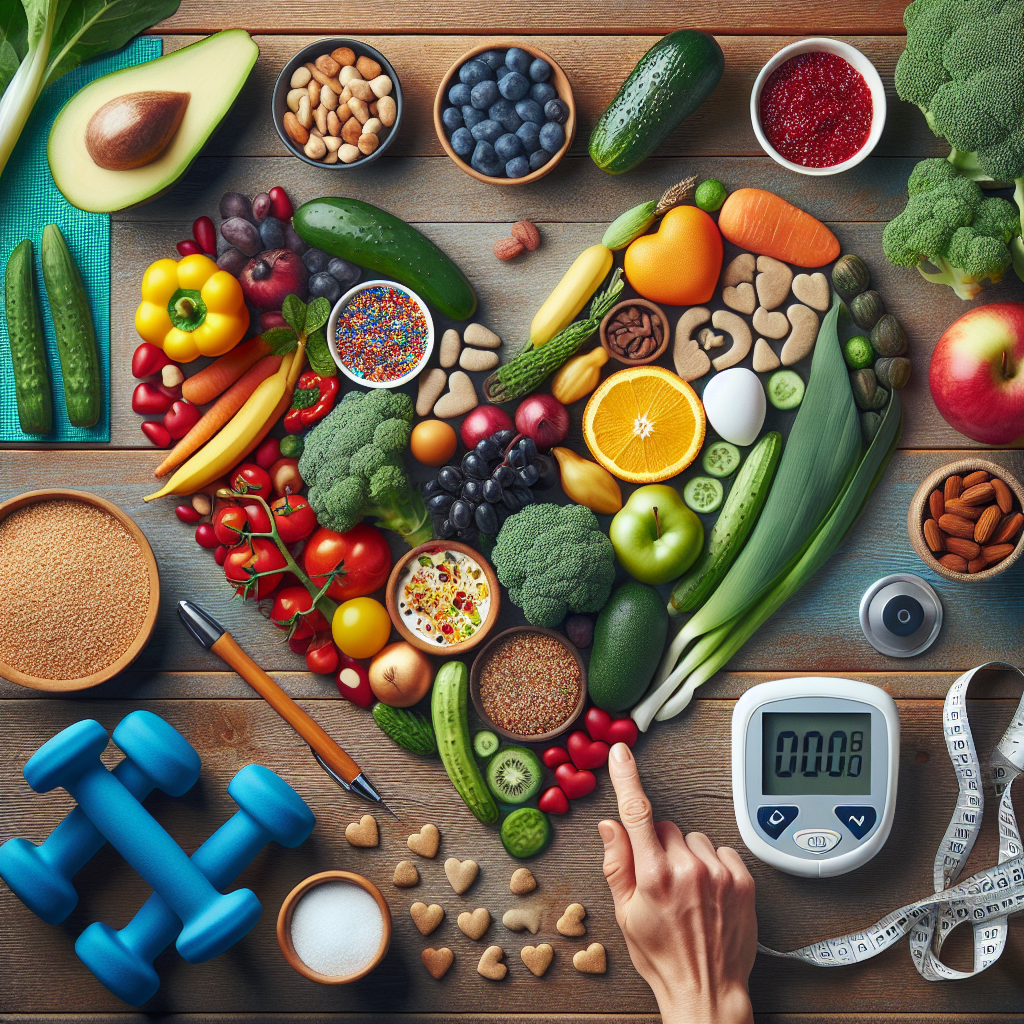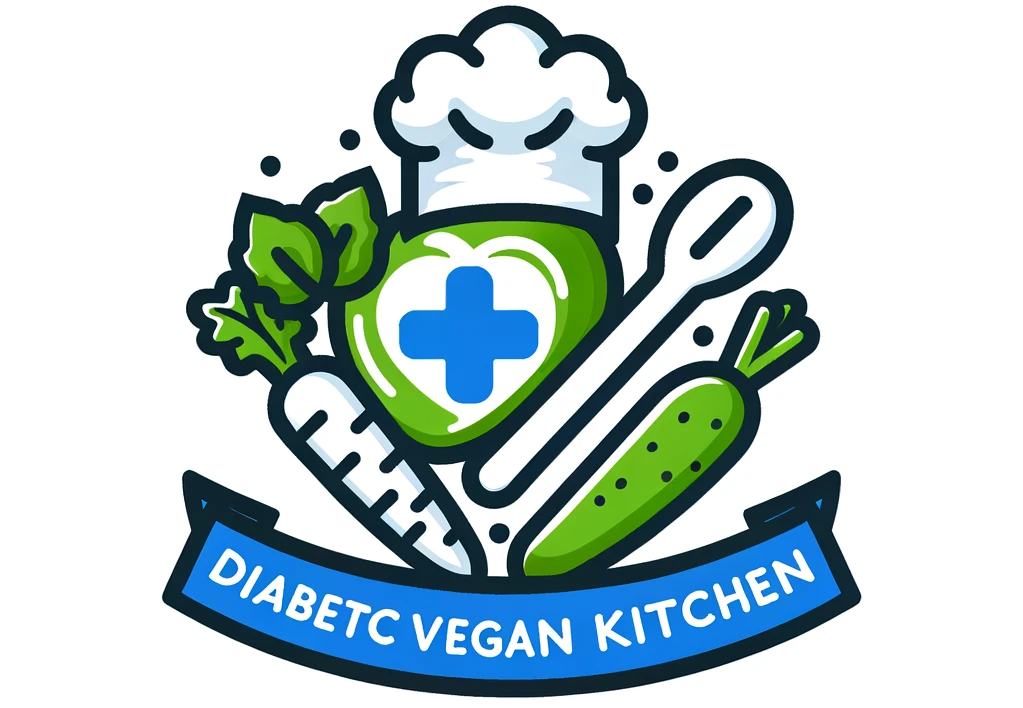Are you someone who is looking to adopt a vegan lifestyle but also needs to manage their diabetes? Look no further, because “The HeartHealthy Vegan Diabetic” is here to guide you through this journey. This article will provide you with valuable tips, delicious recipes, and expert advice on how to maintain a balanced and nutritious diet that supports a healthy heart and manages your diabetes. Whether you are new to veganism or have been living this lifestyle for a while, this article is your go-to resource for a heart-healthy and diabetes-friendly vegan lifestyle.
Understanding Diabetes
What is diabetes?
Diabetes is a chronic condition that affects the way your body utilizes glucose, a type of sugar that serves as the main source of energy. When you have diabetes, your body either doesn’t produce enough insulin or doesn’t use it effectively. Insulin is a hormone that helps regulate blood sugar levels, so without enough of it, glucose can accumulate in the blood, leading to various health complications.
Types of diabetes
There are three main types of diabetes: type 1, type 2, and gestational diabetes.
Type 1 diabetes typically develops during childhood or adolescence and is considered an autoimmune disease. The immune system mistakenly attacks the insulin-producing cells in the pancreas, resulting in little to no insulin production. People with type 1 diabetes require insulin injections or the use of an insulin pump to manage their blood sugar levels.
Type 2 diabetes is more common and usually develops later in life, often being associated with lifestyle factors such as poor diet, sedentary habits, and excess body weight. In type 2 diabetes, the body becomes resistant to the effects of insulin, or the pancreas doesn’t produce enough insulin to meet the body’s needs. It can typically be managed through lifestyle changes, such as diet and exercise, and in some cases, medication.
Gestational diabetes occurs during pregnancy and usually resolves after childbirth. It occurs when the body is unable to produce enough insulin to meet the increased demands during pregnancy. Gestational diabetes requires careful monitoring and management to ensure both the mother and baby’s health.
Effects of diabetes on the heart
Diabetes can have a significant impact on heart health. Individuals with diabetes are at a higher risk of developing heart disease, including conditions such as coronary artery disease, heart attacks, and stroke. The elevated blood sugar levels associated with diabetes can damage blood vessels over time, leading to atherosclerosis, where plaque builds up inside the arteries, restricting blood flow to the heart. Moreover, diabetes often coincides with other risk factors for heart disease, such as high blood pressure and high cholesterol levels. Therefore, it is crucial for individuals with diabetes to prioritize heart-healthy habits to reduce the risk of cardiovascular complications.
Benefits of a Vegan Diet for Diabetics
Reducing blood sugar levels
Following a plant-based vegan diet can be beneficial for individuals with diabetes in managing their blood sugar levels. Plant-based foods, such as fruits, vegetables, whole grains, and legumes, are generally low in glycemic index, meaning they cause a slower and more gradual rise in blood sugar levels compared to high-glycemic foods. The fiber content in these plant-based foods also helps slow down the absorption of glucose, leading to more stable blood sugar levels.
Improving heart health
A vegan diet has been linked to improved heart health due to its emphasis on plant-based foods. By eliminating animal products that are often high in saturated fat and cholesterol, and replacing them with heart-healthy plant-based alternatives, a vegan diet can help lower the risk factors associated with heart disease. Plant-based foods are typically low in saturated fat and high in fiber, which can contribute to improved cholesterol levels and reduced blood pressure.
Lowering blood pressure
High blood pressure is a common comorbidity for individuals with diabetes, further increasing the risk of heart disease. Research suggests that adopting a vegan diet rich in fruits, vegetables, whole grains, and legumes can help lower blood pressure levels. These plant-based foods are packed with potassium, calcium, and magnesium, all of which play a crucial role in regulating blood pressure. Additionally, the naturally low sodium content of a vegan diet can also contribute to a reduction in blood pressure.

Components of a Heart-Healthy Vegan Diet
Choosing plant-based protein sources
Protein is an essential nutrient that plays a vital role in various bodily functions. To ensure an adequate intake of protein on a vegan diet, individuals with diabetes can turn to plant-based protein sources such as legumes (beans, lentils, chickpeas), tofu, tempeh, edamame, quinoa, and seitan. These options provide sufficient protein to meet the body’s needs while staying within the recommended dietary guidelines.
Including healthy fats
While a vegan diet naturally contains lower levels of saturated fats, it’s crucial to incorporate sources of healthy fats into the diet. Foods like avocados, nuts, seeds, and olive oil provide monounsaturated fats and omega-3 fatty acids, which are beneficial for heart health. These fats can help reduce inflammation, improve cholesterol levels, and support overall cardiovascular function.
Prioritizing whole grains and fiber
Whole grains are an excellent source of complex carbohydrates and fiber, making them a valuable addition to a vegan diabetic diet. Foods like whole wheat, brown rice, oats, quinoa, and bulgur are packed with nutrients and can help regulate blood sugar levels due to their high fiber content. Fiber also aids in digestion, promotes feelings of fullness, and improves overall gut health.
Foods to Include in a Vegan Diabetic Diet
Leafy green vegetables
Leafy green vegetables like spinach, kale, Swiss chard, and collard greens are packed with essential vitamins, minerals, and antioxidants. They are low in calories and carbohydrates, making them an excellent choice for individuals with diabetes. Incorporating these nutrient-dense greens into salads, stir-fries, or smoothies can add a healthy boost to any meal.
Berries and citrus fruits
Berries, such as strawberries, blueberries, raspberries, and blackberries, are rich in vitamins, antioxidants, and fiber, while also having a low glycemic index. Citrus fruits like oranges, grapefruits, and lemons are packed with vitamin C and other beneficial compounds. These fruits are a tasty way to satisfy your sweet tooth while keeping your blood sugar levels stable.
Beans and legumes
Beans and legumes are a fantastic source of plant-based protein, fiber, and complex carbohydrates. Options like black beans, lentils, chickpeas, and kidney beans can be used in a variety of dishes, including soups, stews, salads, and veggie burgers. They provide a filling and nutritious component to meals while helping to regulate blood sugar levels and promote heart health.

Managing Carbohydrate Intake
Understanding the glycemic index
The glycemic index (GI) is a measure that ranks carbohydrates based on their effect on blood sugar levels. Foods with a higher GI are more likely to cause a rapid rise in blood sugar, while foods with a lower GI release glucose more slowly. For individuals with diabetes, it’s important to pay attention to the GI of foods consumed to better manage blood sugar levels.
Choosing low-glycemic foods
Incorporating more low-glycemic foods into a vegan diabetic diet can help maintain stable blood sugar levels. Some examples of low-glycemic foods include non-starchy vegetables, whole grains, legumes, nuts, and seeds. These foods contribute to a slow and steady release of glucose into the bloodstream, preventing spikes and crashes in blood sugar levels.
Balancing carbohydrates with protein and fat
When planning meals, it’s essential to balance carbohydrate intake with sources of protein and healthy fats. Including adequate amounts of protein and fat in meals can help slow down the absorption of glucose and prevent blood sugar spikes. For example, pairing whole grains with lentils or adding avocado to a salad can enhance blood sugar control and provide sustained energy throughout the day.
Addressing Nutrient Deficiencies
Vitamin B12 supplementation
Vitamin B12 is primarily found in animal-based products, so individuals following a vegan diet may need to supplement this nutrient. Vitamin B12 is essential for nerve function and the production of red blood cells. Consult with a healthcare professional to determine the appropriate dosage and form of supplementation that suits your needs.
Getting enough omega-3 fatty acids
Omega-3 fatty acids are essential fats that play a crucial role in heart health and cognitive function. While fish is a common source of omega-3 fatty acids, vegans can obtain them from plant-based sources such as flaxseeds, chia seeds, hemp seeds, walnuts, and algae-based supplements. Including these sources in your diet can help ensure an adequate intake of omega-3 fatty acids.
Calcium and Vitamin D sources
Calcium is vital for strong bones and teeth, while vitamin D aids in calcium absorption. Plant-based sources of calcium include broccoli, kale, bok choy, fortified plant-based milk, tofu, and almonds. Sunlight is also a natural source of vitamin D, but if access to sunlight is limited, a vitamin D supplement may be necessary. It’s important to monitor calcium and vitamin D levels and consult with a healthcare professional if supplementation is needed.

Exercise and Physical Activity
Importance of exercise for diabetes management
Regular physical activity is crucial for individuals with diabetes as it helps improve insulin sensitivity, lower blood sugar levels, and reduce the risk of heart disease. Engaging in exercise also promotes weight management, boosts mood, and enhances overall well-being. Aim for at least 150 minutes of moderate-intensity aerobic exercise or 75 minutes of vigorous-intensity aerobic exercise per week, along with strength training exercises.
Types of exercise to consider
When choosing exercise activities, it’s important to focus on cardiovascular exercises that elevate your heart rate, such as brisk walking, cycling, swimming, or dancing. Strength training exercises, using resistance bands or weights, should also be incorporated to build muscle and improve overall body composition. Aim for a combination of aerobic and strength training exercises to reap the multiple benefits exercise has to offer.
Creating an exercise routine
It’s helpful to create an exercise routine that suits your preferences and fits into your daily schedule. Finding activities that you enjoy and incorporating them into your routine will increase the likelihood of sticking to it long-term. Consider exercising with a friend or joining group classes to make the experience more enjoyable and maintain motivation. It’s important to start slowly and gradually increase intensity and duration to avoid injury and accommodate your fitness level.
Stress Management and Sleep
Impact of stress on diabetes and heart health
Stress can have a significant impact on diabetes management and heart health. When stressed, the body releases stress hormones that can raise blood sugar levels and contribute to insulin resistance. Prolonged stress can also raise blood pressure, increase inflammation, and negatively affect overall heart health. Therefore, managing stress levels is vital for individuals with diabetes.
Techniques for stress reduction
There are various techniques that can help reduce stress and promote emotional well-being. Practices such as deep breathing exercises, meditation, yoga, and mindfulness have been shown to have positive effects on stress reduction. Additionally, engaging in hobbies, spending time in nature, or participating in activities that bring joy and relaxation can also help alleviate stress. Finding healthy coping mechanisms that suit your lifestyle can greatly contribute to better stress management.
Promoting restful sleep
Quality, restful sleep plays a vital role in overall health and well-being. Poor sleep can disrupt blood sugar levels, increase insulin resistance, and contribute to the development of heart disease. To promote better sleep, establish a consistent sleep schedule, create a relaxing bedtime routine, limit screen time before bed, and create a sleep-friendly environment. Avoiding caffeine and incorporating relaxation techniques, such as reading or listening to calming music, can also improve sleep quality and enhance your overall health.

Meal Planning and Recipes
Creating a balanced meal plan
Meal planning is crucial for maintaining a healthy vegan diabetic diet. Aim to include a variety of foods from different food groups in every meal to ensure you’re getting a well-rounded mix of nutrients. Focus on whole grains, plant-based protein sources, plenty of non-starchy vegetables, healthy fats, and small portions of fruit. Incorporate different cooking methods, such as steaming, grilling, or baking, to enhance flavors and textures in your meals.
Plant-based diabetic-friendly recipes
There are numerous plant-based recipes that are suitable for individuals with diabetes. Some examples include roasted vegetable quinoa bowls, lentil and vegetable soups, black bean and sweet potato tacos, spinach and chickpea stir-fry, and chia seed pudding with berries. These recipes utilize wholesome ingredients that provide a balance of nutrients while keeping blood sugar levels in check. Experimenting with new recipes and flavors can make mealtime enjoyable and exciting.
Meal prepping and portion control
Meal prepping can be a game-changer for ensuring that you have healthy and balanced meals readily available. Dedicate some time each week to plan and prepare your meals in advance, portioning them into individual containers for easy access throughout the week. This can help reduce the temptation to opt for unhealthy processed foods and make it convenient to stick to your vegan diabetic diet.
Monitoring and Adjusting
Importance of regular monitoring
Regular monitoring of blood sugar levels is essential for individuals with diabetes to maintain optimal health. Checking blood sugar levels regularly allows you to determine how various foods, physical activity, and medications affect your levels. It helps you make informed decisions about your diet and lifestyle choices, enabling you to keep your blood sugar levels within the target range recommended by your healthcare team.
Understanding key indicators
In addition to monitoring blood sugar levels, it’s important to be aware of other key indicators of diabetes control. These may include monitoring blood pressure, cholesterol levels, weight management, and HbA1c levels (a measure of average blood sugar levels over the past three months). Understanding these indicators and working with your healthcare team to keep them within the target ranges can help minimize the risk of complications associated with diabetes.
Modifying the diet and exercise routine
Regular monitoring provides insights into how your diet and exercise routine are influencing your blood sugar levels and overall health. Based on the data obtained, you may need to make adjustments to your diet, such as modifying the amounts or types of carbohydrates consumed, exploring different protein sources, or fine-tuning portion sizes. Similarly, monitoring can help determine if modifications to your exercise routine are necessary, such as increasing or adjusting the intensity and duration of physical activity. Collaborating with your healthcare team is essential to making informed decisions and optimizing your diabetes management.


